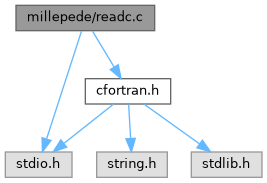
Go to the source code of this file.
Functions | |
| void | initC (int *nFiles) |
| Initialises the 'global' variables used for file handling. | |
| void | resetC (int *nFileIn) |
| Rewind file. | |
| void | closeC (int *nFileIn) |
| Close file. | |
| void | openC (const char *fileName, int *nFileIn, int *errorFlag) |
| Open file. | |
| void | readC (double *bufferDouble, float *bufferFloat, int *bufferInt, int *lengthBuffers, int *nFileIn, int *errorFlag) |
| Read record from file. | |
Variables | |
| FILE ** | files |
| pointer to list of pointers to opened binary files | |
| unsigned int | maxNumFiles |
| max number of files | |
| unsigned int | numAllFiles |
| number of opened files | |
Detailed Description
Read from C/C++ binary files.
- Copyright
- Copyright (c) 2009 - 2015 Deutsches Elektronen-Synchroton, Member of the Helmholtz Association, (DESY), HAMBURG, GERMANY
This library is free software; you can redistribute it and/or modify it under the terms of the GNU Library General Public License as published by the Free Software Foundation; either version 2 of the License, or (at your option) any later version.
This library is distributed in the hope that it will be useful, but WITHOUT ANY WARRANTY; without even the implied warranty of MERCHANTABILITY or FITNESS FOR A PARTICULAR PURPOSE. See the GNU Library General Public License for more details.
You should have received a copy of the GNU Library General Public License along with this program (see the file COPYING.LIB for more details); if not, write to the Free Software Foundation, Inc., 675 Mass Ave, Cambridge, MA 02139, USA.
C-methods to handle input of C/C++ binary files as input for the fortran pede program (see peread). This includes macros utilising cfortran.h to allow direct callability from fortran.
initC() has to be called once in the beginning, followed by one or several calls to openC() to open one or several files. readC() is then called to read the records sequentially. resetC() allows to rewind files.
If compiled with preprocessor macro USE_SHIFT_RFIO, uses libRFIO, i.e. includes shift.h instead of stdio.h
If compiled with preprocessor macro USE_ZLIB, uses libz, enables direct reading of gzipped files.
Written by Gero Flucke (gero..nosp@m.fluc.nosp@m.ke@ce.nosp@m.rn.c.nosp@m.h) in 2006/7
- update on July 14th, 2008
- update on October 29th, 2008: return for file number in
readC()
Major updates on April 24th, 2012 by C.Kleinwort:
- skip records larger than buffer size (to determine max record length)
- dynamic allocation of file pointer list (no hard-coded max number of files)
Major update on February 26th, 2014 by C.Kleinwort:
- implement reading of records containing doubles (instead of floats) indicated by negative record length.
Last major update on April 10th, 2019 by C.Kleinwort:
- Option to close and reopen files
Definition in file readc.c.
Function Documentation
◆ closeC()
| void closeC | ( | int * | nFileIn | ) |
Close file.
- Parameters
-
[in] nFileIn File number (1 .. maxNumFiles)
◆ initC()
| void initC | ( | int * | nFiles | ) |
Initialises the 'global' variables used for file handling.
- Parameters
-
[in] nFiles Maximal number of C binary files to use.
Definition at line 86 of file readc.c.
◆ openC()
| void openC | ( | const char * | fileName, |
| int * | nFileIn, | ||
| int * | errorFlag | ||
| ) |
Open file.
- Parameters
-
[in] fileName File name [in] nFileIn File number (1 .. maxNumFiles) or <=0 for next one [out] errorFlag error flag: - 0: if file opened and OK,
- 1: if too many files open,
- 2: if file could not be opened
- 3: if file opened, but with error (can that happen?)
Definition at line 155 of file readc.c.
◆ readC()
| void readC | ( | double * | bufferDouble, |
| float * | bufferFloat, | ||
| int * | bufferInt, | ||
| int * | lengthBuffers, | ||
| int * | nFileIn, | ||
| int * | errorFlag | ||
| ) |
Read record from file.
- Parameters
-
[out] bufferDouble read buffer for doubles [out] bufferFloat read buffer for floats [out] bufferInt read buffer for integers [in,out] lengthBuffers in: buffer length, out: number of floats/ints in records (> buffer size: record skipped) [in] nFileIn File number (1 .. maxNumFiles) [out] errorFlag error flag: - -1: pointer to a buffer or lengthBuffers are null
- -2: problem reading record length
- -4: given buffers too short for record
- -8: problem with stream or EOF reading floats
- -16: problem with stream or EOF reading ints
- -32: problem with stream or EOF reading doubles
- =0: reached end of file (or read empty record?!)
- =4: found floats
- =8: found doubles
Definition at line 220 of file readc.c.
◆ resetC()
| void resetC | ( | int * | nFileIn | ) |
Rewind file.
- Parameters
-
[in] nFileIn File number (1 .. maxNumFiles)
Definition at line 121 of file readc.c.
Variable Documentation
◆ files
| FILE** files |